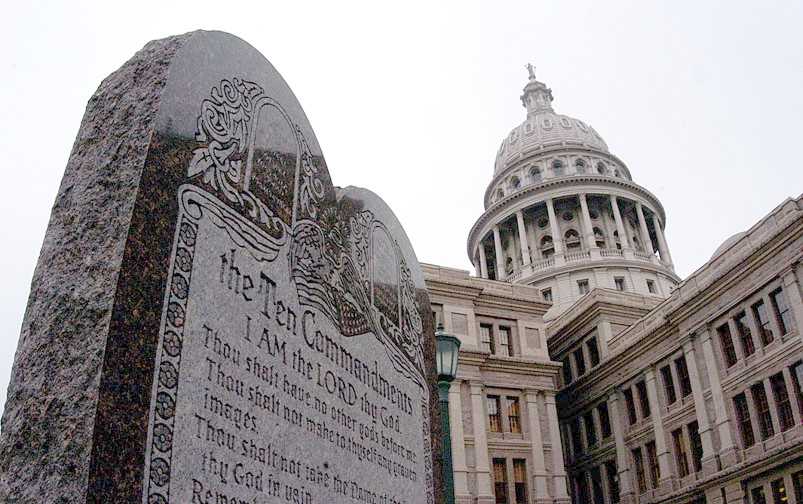AUSTIN — After scoring a legislative victory with a new law requiring classrooms to display the Ten Commandments, state Sen. Phil King of Weatherford says he’s ready for the next round: a court challenge asserting that the mandate on Texas schools violates the fundamental principle separating church and state.
Enacted by the recently adjourned regular session of the Texas Legislature, King’s Senate Bill 10 requires a version of the Ten Commandments to be displayed in every classroom beginning Sept. 1. Gov. Greg Abbott signed the bill into law on June 20.
The American Civil Liberties Union of Texas and allied groups filed suit in a San Antonio federal court July 2 declaring the law violates the religious rights of students and parents and “is plainly unconstitutional.” It also seeks a preliminary injunction to keep the law from going into effect pending the resolution of the suit.
“The lawsuit is no surprise,” King told the Fort Worth Report, predicting victory in the legal case. “That’s what the left does.”
Tommy Buser-Clancy, a senior staff attorney for the ACLU of Texas, said the plaintiffs will seek to prove that “imposing the Ten Commandments in every single classroom” will pressure students to follow predominantly Protestant religious dictates, regardless of their own beliefs.
Plaintiffs included 16 families of different religious and nonreligious views, including Jewish, Christian, Hindu and Unitarian Universalists.
“This simply cannot be reconciled with the fundamental religious-freedom principles that animated the founding of our nation,” the 64-page petition said in reference to SB 10’s requirements.
A Dallas activist group, the Next Generation Action Network Legal Advocacy Fund, also filed suit against the state and some school districts in Dallas County to block the rollout of the law.
Texas’ proposed Ten Commandments requirement provoked impassioned legislative testimony on both sides of the issue as King guided his bill through the Senate and Rep. Candy Noble, R-Lucas, advanced the measure in the House, both garnering strong Republican support.
Tarrant County lawmakers were largely divided along party lines, with Tarrant’s seven House Republicans supporting the bill while the four Democrats opposed.
All five senators representing Tarrant County — including Sen. Royce West of Dallas — voted in favor of the bill. West was the only Senate Democrat who voted for SB 10.
King, a former Fort Worth policeman who has been in the Legislature since 1999, said the Ten Commandments have been part of his life since childhood but were banned from classrooms by the Supreme Court’s 1980 ruling in Stone v. Graham.
The ACLU of Texas says “it has been well-settled” for nearly a half-century that public schools are forbidden from posting the Ten Commandments.
‘We’ll win that battle’
 Rep. Giovanni Capriglione, upper left, and Sen. Phil King, upper right, clap as Gov. Greg Abbott signs the first major law of the 2025 Legislature, establishing a DOGE agency in Texas on April 23, 2025. Lt. Gov. Dan Patrick, bottom right, also attended the signing. (David Montgomery | Fort Worth Report)
Rep. Giovanni Capriglione, upper left, and Sen. Phil King, upper right, clap as Gov. Greg Abbott signs the first major law of the 2025 Legislature, establishing a DOGE agency in Texas on April 23, 2025. Lt. Gov. Dan Patrick, bottom right, also attended the signing. (David Montgomery | Fort Worth Report)
Others, including King, say a more recent standard allows the display. They point to a Supreme Court ruling in 2022 which upheld the right of Washington State high school coach Joseph Kennedy to engage in a religious observance by praying in the middle of the field following a football game.
“I feel very confident, if there is a lawsuit on the Texas Ten Commandments, that the Supreme Court will uphold our statute,” said King, whose eight-county Senate district includes part of Tarrant County.
“It’s so popular,” he said, describing the public’s reaction to SB 10. “I can’t tell you how many people I’ve run into that bring it up. I think the general public is very excited about it.”
King, an evangelical Christian, hears that much of the public believes in the importance of displaying the Ten Commandments in every K-12 classroom so students can see its teachings, he said.
“And then also, I think people want God recognized in their classrooms. They don’t want him banned from the classrooms,” King said.
“When we were kids, the Ten Commandments were in public buildings,” he said. “It was in schools. Everybody just recognized that was just a wonderful statement of morality. It was something that we were taught from day one, just like the Golden Rule.”
As attorney general in 2005, Abbott successfully argued the U.S. Supreme Court to continue allowing Texas to keep a Ten Commandments monument on the grounds of the state capitol.
The three-term governor has also predicted that Texas will prevail in a suit against SB 10.
“We’ll win that battle,” Abbott said.
SB 10 requires the commandments to be a minimum of 16 by 20 inches in size and located in a conspicuous place in each classroom. The commandments must also be printed in a size and typeface that is “legible to a person with average vision from anywhere in the room.”
What must be displayed in public classrooms?
Senate Bill 10 requires all Texas public school classrooms to feature a sign with the Ten Commandments. Here’s what the law requires to be displayed:
The Ten Commandments
I AM the LORD thy God.
Thou shalt have no other gods before me.
Thou shalt not make to thyself any graven images.
Thou shalt not take the Name of the Lord thy God in vain.
Remember the Sabbath day, to keep it holy.
Honor thy father and thy mother, that thy days may be long upon the land which the Lord thy God giveth thee.
Thou shalt not kill.
Thou shalt not commit adultery.
Thou shalt not steal.
Thou shalt not bear false witness against thy neighbor.
Thou shalt not covet thy neighbor’s house.
Thou shalt not covet thy neighbor’s wife, nor his manservant, nor his maidservant, nor his cattle, nor anything that is thy neighbor’s.
‘An array of faiths’
The ACLU of Texas suit noted that, of the 5.5 million students enrolled in public schools, children and their families “adhere to an array of faiths, and many do not practice any religion at all” but because of Senate Bill 10, “all of these students” will be exposed to a “state-approved, Protestant version of the Ten Commandments” and “will be forcibly subjected to scriptural dictates, day in and day out.”
The Texas law, says the suit, comes in contrast to “a long line of Supreme Court jurisprudence that prohibits public schools from imposing religious doctrine and practice on students.”
Joining the ACLU of Texas in bringing the suit were the national American Civil Liberties Union, Americans United for Separation of Church and State, and the Freedom From Religion Foundation. Plaintiffs include the families of children in nearly a dozen school districts in Central Texas, Houston and Plano, who were named as defendants.
Several of the plaintiffs were quoted in the petition.
“As a rabbi and public school parent, I am deeply concerned that SB 10 will impose another faith’s scripture on students for nearly every hour of the school day,” said Rabbi Mara Nathan, the mother of a student at Alamo Heights ISD near San Antonio.
“While our Jewish faith treats the Ten Commandments as sacred,” she added, “the version mandated under this law does not match the text followed by our family, and the school displays will conflict with the religious beliefs and values we seek to instill in our own child.”
Other states enact similar law
Texas is one of several states that began embracing the Ten Commandments as a result of shifting federal court mandates.
Lawmakers in South Carolina, Oklahoma and other states have also introduced Ten Commandments requirements.
Louisiana was ahead of the Lone Star State when it enacted a law requiring the display of the Ten Commandments in public classrooms. A federal appeals court recently blocked the law, upholding a lower court ruling.
The case now moves to the U.S. Supreme Court.
Dave Montgomery is an Austin-based freelance reporter for the Fort Worth Report.
The Fort Worth Report’s Texas legislative coverage is supported by Kelly Hart.
At the Fort Worth Report, news decisions are made independently of our board members and financial supporters. Read more about our editorial independence policy here.
Related
Fort Worth Report is certified by the Journalism Trust Initiative for adhering to standards for ethical journalism.
Republish This Story
Republishing is free for noncommercial entities. Commercial entities are prohibited without a licensing agreement. Contact us for details.
